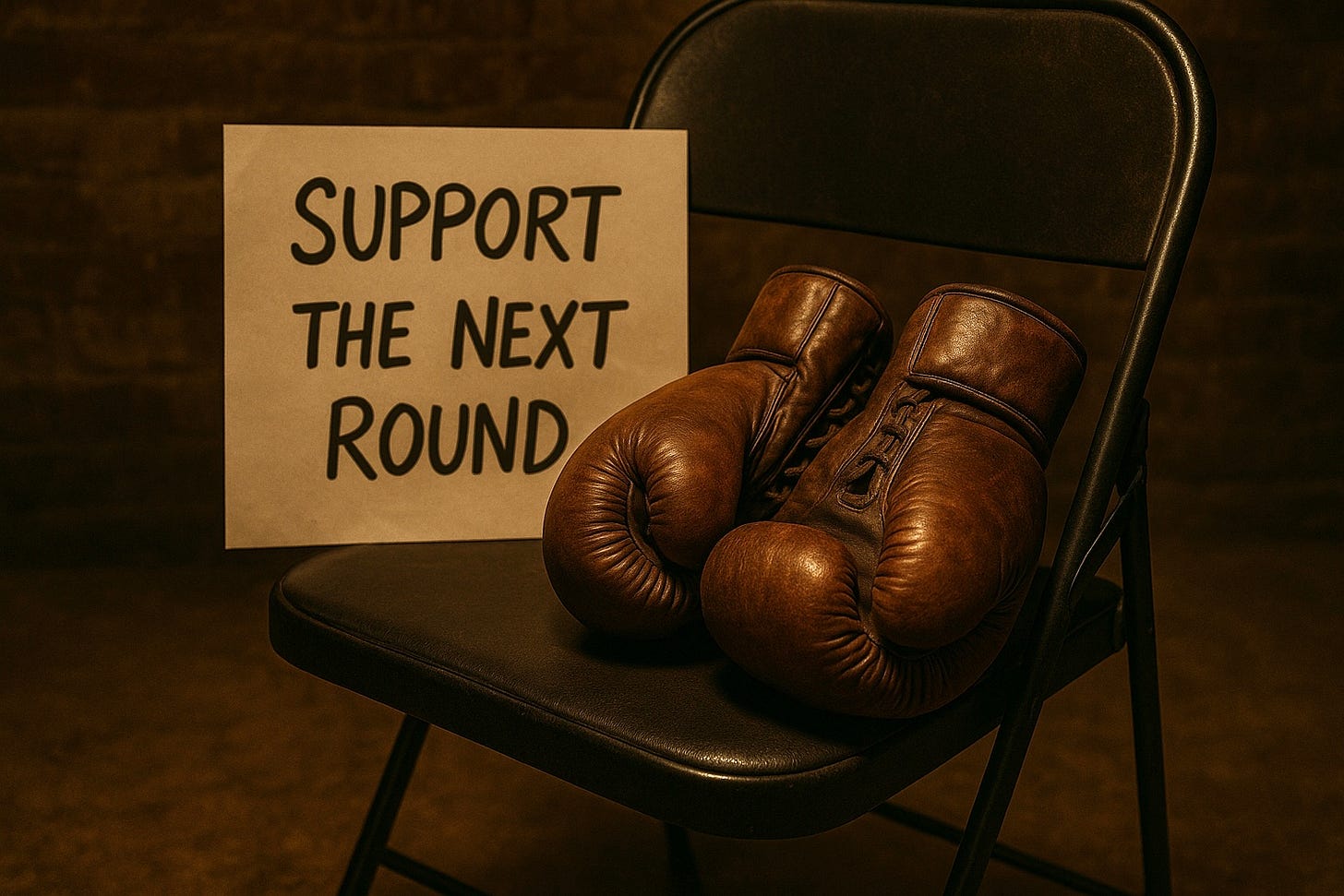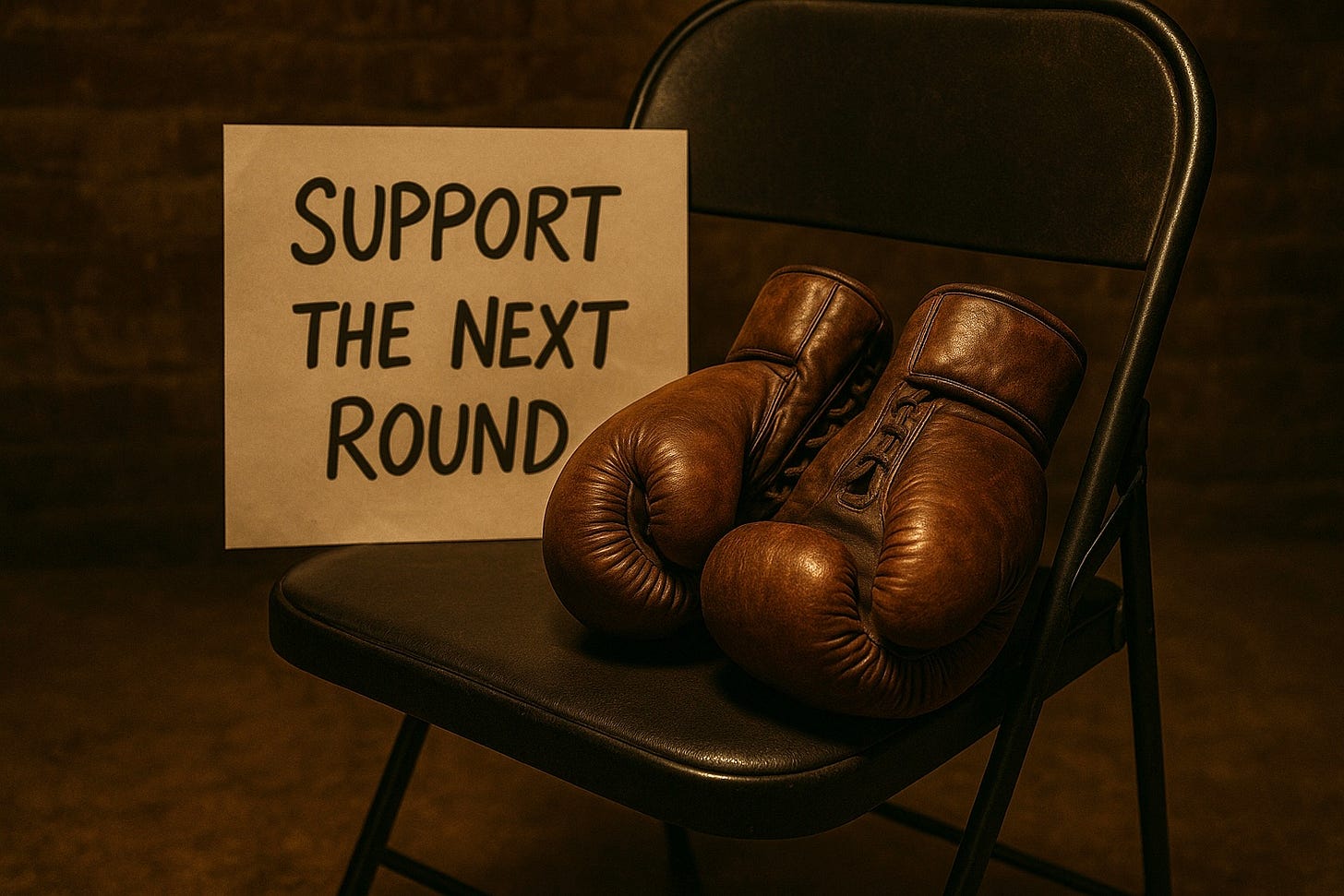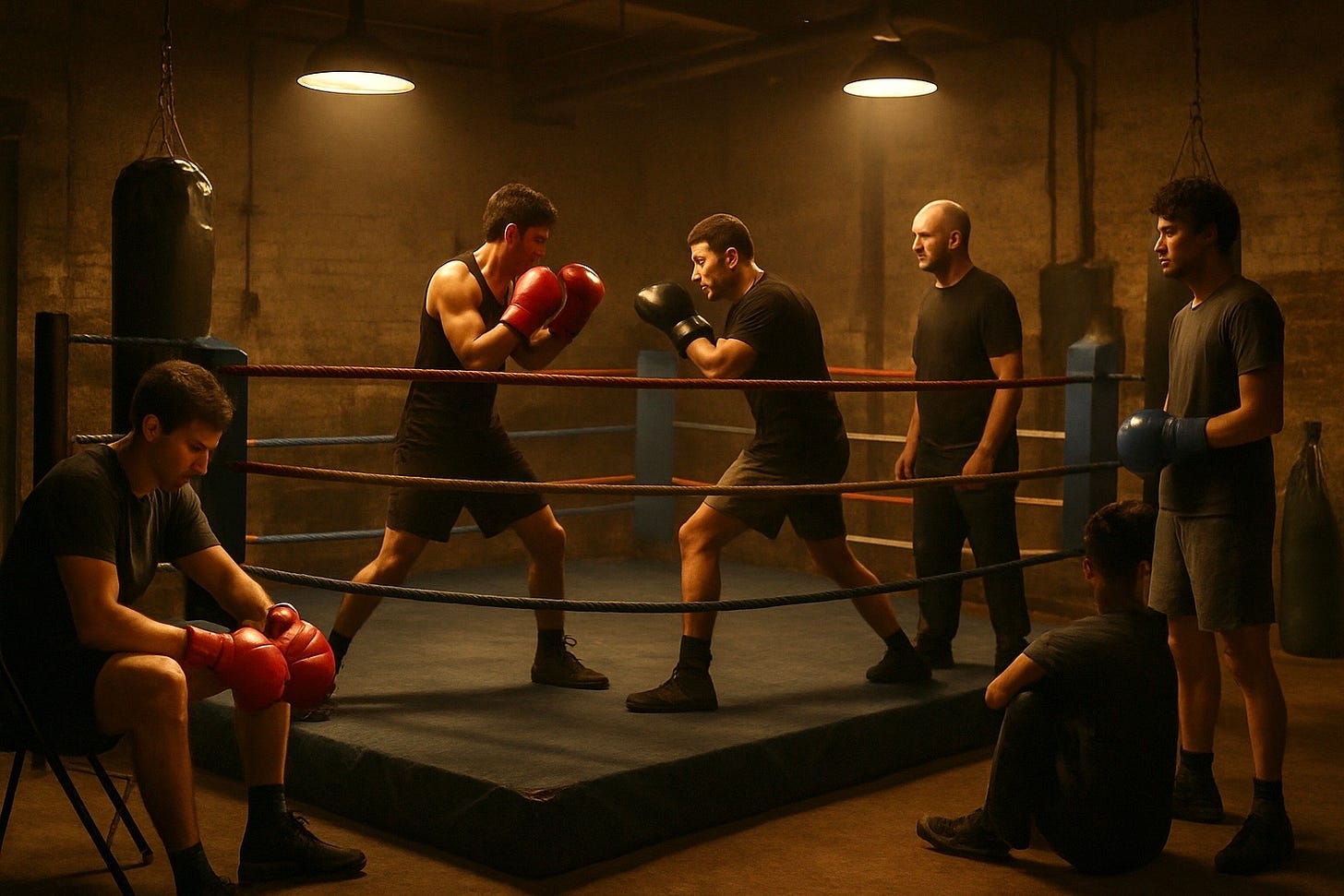a psychotherapist treating men gladly: ‘The Corner Club’: “gloves up, guard down!”
boxing training and group reflective circles for men
Sue Parker Hall: I was first introduced to Stefan Imeson’s work when I watched a short film made about his and a colleague’s ‘Football Beyond Borders mental health support work with young men. I was deeply moved and impressed by the quality, compassion and camaraderie of the relationships that were the vehicle for their work and the therapeutic skills that felt natural rather than devised. Their approach respects the biological and evolutionary roots of masculinity that are so undermined by current ideology. I am full of admiration for his work.
safety and risk: Stefan tells me most of the young men he works with are at serious risk of being groomed into gangs, carrying knives and being violently attacked by rival gang members and their peers. In comparison, a controlled environment which allows for an infinitely safer expression of aggression and physical strength, and at the same time teaches young men self control, discipline and the kind of belonging and confidence that is likely to deter them from needing to be involved with low level criminal and violent activity in the first place. Most sessions are non-contact training - sparring is always optional and boxers are only allowed to spar with very padded gloves (16oz) head and mouth guards.
Stefan is the co-founder and one of 3 directors of ‘The Corner Club’. He is a qualified teacher and therapist with an MA in group and individual psychotherapy. He has spent the last 18 years teaching in Inner-London secondary schools and in the third sector with various different organisations including ‘Working With Men’ (now ‘Future Men’) and ‘Football Beyond Borders’.
‘The Corner Club’ are crowdfunding to buy a boxing ring and equipment for a community space in Peckham.
If you like what you read please support his important work and contribute to his Crowdfunder.
https://www.crowdfunder.co.uk/p/off-the-ropes-summer-club-for-young-men
Stefan’s piece
My time studying psychotherapy at the Gestalt Centre in London served as a painful reminder that, in today’s climate, male anger, healthy aggression and even assertiveness elicit at best, distrust and, at worst, lands a male in a Kangaroo court confronted with ‘be kind’ Critical Social Justice informed jurors whose intention is to ‘educate’ him that he is the problem and that if he doesn’t abandon these biological and evolutionary masculine traits,(traits that function to protect and provide), and unquestioningly adopt more stereotypical feminine traits (empathy, gentleness and acquiescence) he will forfeit both belonging in the group and his academic success.
It is now more critical than ever to develop ways of working with men, particularly young men, that honour the masculine and a colleague and I are committed to that.
As a recent Corner Club ‘reflective circle’ entered its final minutes, a 17-year-old participant said “I don’t want the session to end… I won’t get to talk like this until the next time we meet”.
That session had started as they often do; stilted, slightly awkward and yet somehow buzzing with the anticipation of the potential connection and intimacy which so often feels taboo or forbidden for men; especially in the spaces they generally find each other which, as many of our participants frequently point out, seem rarely to exist outside of communal football watching, online videogaming or trips to the pub.
For context, before our reflective circles begin, the men my colleague and I work with have already undergone an hour of intensive boxing training with qualified coaches who put them through their paces. In James Joyce’s brilliant short story ‘A Painful Case’, he describes a character, ‘Mr. Duffy’, who lives ‘…a short distance from his body’. Lots of the men we work with live this way, lots of men in general live this way. I often live this way; detached from my emotions and experience, disengaged from my own inner life which often silently screams from a cauterised, anaesthetised and distrusted layer of ‘felt sense’ buried beneath a topsoil of adjustments, survival strategies and willed detachment.
I have worked, in various capacities, with men of different ages for the last 18 years. Despite the big brand-backed ad-campaigns and admirable efforts of countless public initiatives (and the resulting shifts in cultural attitudes - in some quarters) promoting men’s mental health, not a huge deal has changed. The pernicious impact of identitarianism and its positioning of men as the irrefutable beneficiaries of the divine privilege their immutable birthrights confer upon them, has, in many ways, done more harm than good. One need only look at the voracious consumption of Andrew Tate’s output -which increasing numbers of men, sadly, swallow whole - to understand Joseph Campbell’s adage that ‘those who feel unseen will follow any light’. Lots of the young men I have worked with throughout my career as a teacher, mentor, youth worker and therapist have spoken bitterly about their resentment of a world which makes them feel as if they are inherently flawed, predatory, dangerous or untrustworthy. I would argue that the current crippling polarisation of political opinion at the extremes of the ‘woke’ left vs the real ‘far right’, mirrors this process: make people feel like they’re bad and watch them flock to the light of people who require nothing but the rejection of an unsupportive culture and economy foisted upon them.
‘The Corner Club’ Crowdfunder:
https://www.crowdfunder.co.uk/p/off-the-ropes-summer-club-for-young-men
Our project was born out of a stereotypical yet ‘more than meets the eye’ archetypically masculine activity - boxing. Mitch, my fellow co-founder, a working-class man with roots in the traveller community, and I, found ourselves collapsed on a patch of grass near his house after a 1-1 session a few years back. After working up a sweat and engaging in intense physical activity and light combat, we opened up to each other. We spoke of loss and grief, of fear and confusion around our roles as men in a frighteningly complex and seemingly contradictory social climate; of how difficult it could feel to be demonstrative without feeling diminished in our masculinity; of how impossible it often feels to be simultaneously unapologetically masculine and in touch with our ‘feminine sides’. Mitch pondered: “how amazing would it be to do this with other blokes?... to have a scrap (box) and then just let it all out?”. Serendipitously, I was training as a group psychotherapist, and Mitch was building a client base of young men keen to learn the ‘sweet science’ of ringcraft and self-defence. Intuitively, we knew that many men might benefit from being able to ‘go the extra round’ and open up, be intimate with one another, as we had done, once they had been able to access a space which allows for what is sadly a much-maligned rite of passage for lots of men, hitting and being hit. Importantly, we are talking about controlled aggression here – not attacking people or committing random acts of violence.
At The Corner Club we run sessions with men of all ages, from 10 years old to men in their 50’s (in separate groups, of course!) We get men of all shapes, sizes and abilities moving their bodies and owning, expressing and harnessing their aggressive urges. We don’t deride or demonise aggression, anger or even fighting – providing it is safe, consensual and mediated by trained professionals. The progressive left wish to banish this ‘patriarchal’ ‘primitive’ activity but we have been witnesses to it’s power for good.
This is not to say that all men, deep down, are desperate to knock ten bells out of each other, but rather that lots of them have repressed these urges partly in response to the obvious social pressure to disown them. The current statistics on male violence; enacted upon other men, women, and frequently ‘retroflected’ (75-80% of UK suicides are male) suggest that these energies haven’t gone anywhere, despite the misunderstanding and best efforts of biology and evolutionary denying social-constructivists.
And here’s the kicker - after our boxing sessions, after these activities are carried out, guess what? The men in our groups begin to tap into the other parts of their personalities: the tender, the vulnerable, the frightened, sad and lonely parts of them that usually feel too stigmatised and dangerous to embrace... and certainly to share with other men. They talk of failed relationships with their fathers, the crushing weight of pain and suffering they keep to themselves for fear of being ridiculed or ostracised by male peers and the life changing relief that often comes with being able to own their own complexity.
‘The Corner Club’ currently operates in several South-East London schools and community centres. We are currently crowdfunding to buy boxing rings, bags, gloves and other equipment to enable our participants to take part in our sessions, free of charge. We believe that our project has the potential to positively impact the lives of boys and men at a crucial point in history where many men feel abandoned, angry, lost, scared and deprived of spaces to move, talk, relate, be heard and heal: Gloves Up, Guards Down!
Crowdfunder:
https://www.crowdfunder.co.uk/p/off-the-ropes-summer-club-for-young-men.
Resources
The Centre for Male Psychology









What an excellent idea! So glad this Therapist has managed to get this off the ground as the combination of physical activity and therapy must prove unbeatable!
I must admit to a little surprise however at how the founder has avoided accusations of 'racism/Nazi-ism/far-right extremism' for aiming the group at white males.
I remember reading about a former Prison Officer, a young married Christian father of two young girls who - inspired by the sight of the disaffected young men he saw in prison - attempted to set up an Athletics club for young, working class white males to distract them from forming purposeless gangs, instead giving them a sense of pride in their identity plus an experience of male camaraderie. Unfortunately he ended up with a 13-year sentence as Counter-Terrorism suspected him of raising up a type of Guerilla organisation which to this day he denies was his intention.
It's great to see that these types of organisations can succeed and that the professional Psychotherapy registration maybe helped in this case.
Absolutely wonderful, Stefan